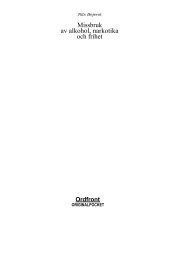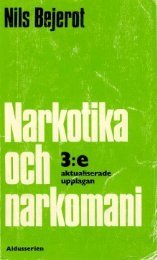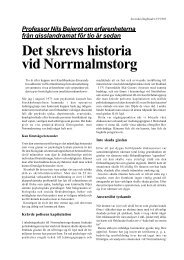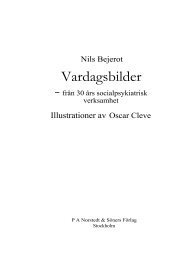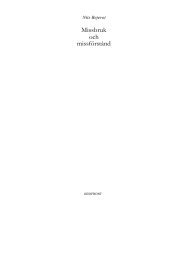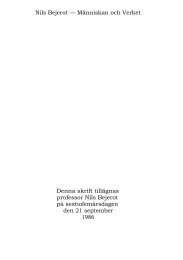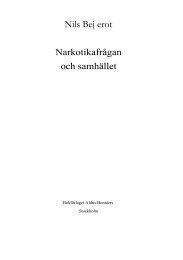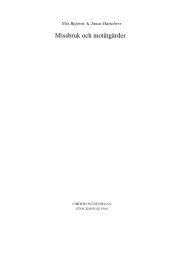Narkomani som artificiellt framkallad drift - Nils Bejerots Minnesfond
Narkomani som artificiellt framkallad drift - Nils Bejerots Minnesfond
Narkomani som artificiellt framkallad drift - Nils Bejerots Minnesfond
You also want an ePaper? Increase the reach of your titles
YUMPU automatically turns print PDFs into web optimized ePapers that Google loves.
att »den fria viljan» är satt ur spel inom den sektor<br />
<strong>som</strong> behärskas av giftberoendet och att narkomanen<br />
viljemässigt endast har begränsad möjlighet att modifiera<br />
detaljer i sitt beroendetillstånd.<br />
att behandlingskrafterna sammantagna måste vara<br />
starkare än kraften i drogberoendet om man skall ha<br />
någon utsikt till framgång i behandlingen,<br />
att ett visst inslag av tryck, kontroll och tvång<br />
tyvärr är ofrånkomligt om man skall lyckas bryta<br />
det starka drogbegäret,<br />
att narkomani är ett tillstånd av kronisk karaktär<br />
och att risken för återfall ständigt lurar, särskilt de<br />
första åren efter drogavbrottet,<br />
att eftervården och den noggranna kontrollen —<br />
och förnyad behandling vid återfall — är helt<br />
avgörande för prognosen,<br />
Addiction as an artificially induced instinct<br />
A theory<br />
NILS BEJEROT<br />
It is commonly argued that addiction is a symptom of<br />
psychological or social maladjustment. This often applies<br />
to abuse of drugs, but when addiction supervenes this is<br />
in itself a morbid condition with its own dynamics.<br />
Removing the cause of the initial drug abuse will then<br />
not affect the established addiction. The most essential<br />
element in addiction is the desire to obtain a pleasurable<br />
effect. During the phase of abuse the individual can steer<br />
his drug consumption, bur this is no longer the case when<br />
addiction is established. Drug dependence has then<br />
developed the character and strength of a natural instinct.<br />
The arranging of the details around the drug consumption<br />
are still under voluntary control (the same applies to<br />
instinctive behaviour), but the individual finds it as<br />
difficult to suppress his addictive. live behaviour as his<br />
instinctive drives (e.g. sex, hunger). Addictive behaviour<br />
may be best understood when regarded as an artificially<br />
induced instinct.<br />
LITTERATUR<br />
1.Bejerot, N.: Läkartidningen 1965:62:4231-4238.<br />
2. Bejerot, N.: Narkotikafrågan och samhället. Aldus/Bonniers,<br />
Stockholm 1968.<br />
3. Bejerot, N.: Internat, J. Addict. 1969:3:391-405.<br />
4. Bejerot, N.: Läkartidningen 1970:67:2413-2429.<br />
5. Bejeerot, N.: Addiction and society. Thomas, Springfield 1970.<br />
6. Lewin, L.: Phantastica. Narcotic and stimulating drugs. Their use<br />
and abuse. Routledge & Kegan. London 1964.<br />
7. Lindroth, C. M.& <strong>Nils</strong>son, L.: Myror. Forum, Stockholm 1959.<br />
att det endast finns ett säkert sätt att besegra<br />
narkomanierna — preventionen.<br />
Svaret på den gamla klassiska frågan om varför<br />
Jeppe super skulle alltså (i de flesta fall) vara:<br />
»Jeppe super därför att han utvecklat ett alkoholberoende.»<br />
Om denna teori visar sig bärkraftig, kommer det<br />
att bli mycket <strong>som</strong> vi måste ompröva beträffande de<br />
beroendeframkallande medlens status och roll och<br />
särskilt beträffande behandlingen av de maligna<br />
beroendetillstånden. Då måste också preventionstänkandet<br />
bli det centrala i hela den sociala och<br />
medicinska strategin på detta område.<br />
The pleasure-pain-principle seems to be the primary<br />
biological steering mechanism in the animal world. The<br />
satisfaction of natural drives gives pleasure, and repression<br />
of instinctive drives gives discomfort. Normally the<br />
pleasure-pain-principle furthers the adjustment of the<br />
individual and the survival of the species. Addicting drugs<br />
provide the means of gratifying the desire for pleasure,<br />
but at the expense of the adjustment and survival of the<br />
individual and at the cost of society.<br />
In nature addiction occurs among <strong>som</strong>e social insects,<br />
for instance ants and termites, and it can be induced in<br />
any animal if certain substances are administered in<br />
certain quantities for a certain period of time. This shows<br />
that no psychological or social maladjustment is required<br />
for addiction to develop.<br />
Other conditions which theoretically appear to be based<br />
on artificially changed or induced instincts are overeating,<br />
anorexia nervosa and gambling.<br />
8. Möller, K. O.: Nord. Med. 1955:54:1533-1539.<br />
9. Rado, S. Comp.Psych. 1963:4:160-167.<br />
10. Olds, J.: In Ramy & O’Doherty (eds.), Electrical studi on the<br />
unaesthetized brain, Hoeber 1960.<br />
11. Seevers, M.: J.Amer.Med.Ass. 1968:206:1263-1266.<br />
12. Seevers, M.: Mich.Quart.Rev. 1969:8:3-14.<br />
13. Varilo, E.: Nord.psykiat.t. 1970:24:56-71.<br />
14. Wikler, A.: Opiate addiction: Psychological and neurophysiological<br />
aspects in relation to clinical problems. Thomas, Springfield,1953.<br />
Nordisk Medicin 7. I. 1971, bd 85, nr 1 27



